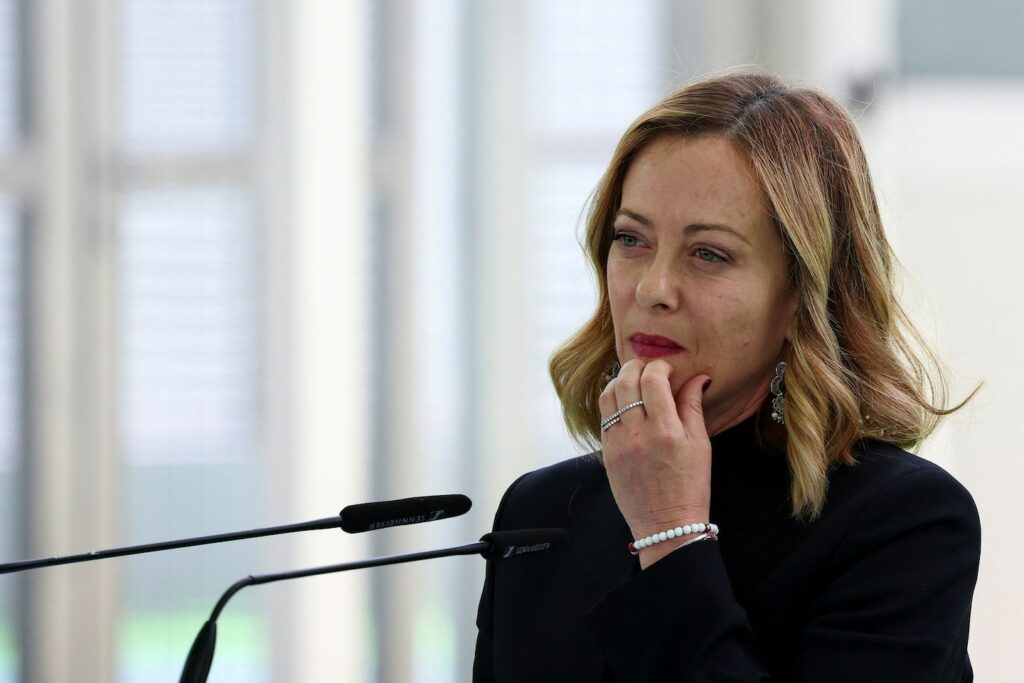PARIS — The courtship of Giorgia Meloni, a long-running drama, reaches an inflection point this week, as Europeans across 27 nations go to the polls. The outcome of the European Parliament elections — along with the continent’s stance on defense, climate change, migration and the economy — might depend largely on the shape-shifting Italian prime minister.
It’s a jarring moment for a right-wing politician dismissed not long ago as a rabble-rousing extremist whose quick ascent caused heartburn among mainstream Western leaders, not least President Biden, when she took office less than two years ago.
As head of Italy’s 69th government since World War II, the first headed by a woman, Meloni has grappled with one of the world’s highest debt burdens and lowest birthrates, not to mention a devastating pandemic toll. She has managed neither to deter a flood of migrants, as she promised in her campaign, nor to reform Italy’s sclerotic economy, stagnant for a quarter-century.
Yet she has played a weak hand shrewdly. So shrewdly, in fact, that Meloni is regarded as the key power broker in jockeying expected to follow elections culminating Sunday to the Parliament representing the European Union’s 450 million people.
If she is cast in that role, which European leaders expect, she will face a critical choice in setting the continent’s course for the rest of this decade.
In stark terms, she would have two options. One is to position the nationalist faction she leads in the European Parliament with pragmatists who have deepened Europe’s integration for decades, building a consensus to fight climate change and Russian aggression. The other is to join forces with hard-right populists closer to her ideologically — the likes of the French hard-right leader Marine Le Pen and Hungarian Prime Minister Viktor Orban — whose contempt for European rulemaking, carbon-reduction measures and, many fear, Ukraine’s fight for sovereignty would challenge Europe’s identity and values.
And no one knows what Meloni would do.
Her rival suitors are European Commission President Ursula von der Leyen, a mainstream German conservative, and Le Pen, who has scrubbed her party’s antisemitic heritage and now tops French polls. Each has been brash in pursuit of Meloni. Neither has received her embrace.
The Italian leader, no one’s fool, is biding her time. She is keeping options open — along with an eye on polls suggesting broad gains for right-wing parties, including her own, in the elections. Polls show hard-right parties in first or second place across much of the E.U., including Germany, France, Spain, Poland and Italy.
If those surveys are correct, it would mean that von der Leyen, seeking a second five-year term as the E.U.’s chief executive, could struggle to cobble together a coalition with her diminished centrist allies. She has made no secret that she might want or need backing from Meloni’s faction.
“She is clearly pro-European, against [Russian leader Vladimir] Putin … and pro-rule of law,” von der Leyen said last month. If that holds, she added, “then we offer to work together.”
But a grand bargain with Meloni would enrage members of von der Leyen’s own moderate grouping of lawmakers, prompting some to vote against her in the Parliament’s secret balloting.
Meanwhile, Le Pen has openly appealed for a broad right-wing bargain to merge her forces with Meloni’s. Together, they could form a pact whose combined strength, amounting to perhaps one-fifth or more of the fragmented Parliament’s 720 seats, would be a jolt to business as usual in Brussels. “This is the moment to unite,” Le Pen told the Italian newspaper Corriere della Sera last month.
In some ways, Meloni’s choice could be whether to follow her head or her heart.
The former would mean hewing to the center, reassuring markets and safeguarding Italy’s massive subsidies from Brussels — more than $200 billion in pandemic recovery funds, by far the E.U.’s biggest chunk.
The latter would mean doubling down on causes that drove Meloni’s political rise. Those include culture-war appeals to defend Europe’s ethnic identity against a migrant surge, traditional families against LGBTQ+ rights and national sovereignty against the E.U.’s regulatory overreach.
A deft tactician, Meloni since taking power has retained close ties with other European far-right leaders, including Le Pen and Orban, longtime admirers of Putin. And she has simultaneously managed to tamp down her once-incendiary rhetoric, detoxifying her own party despite its origins in postwar Italian fascism, and reassure Biden and other major NATO allies by unreservedly backing Ukraine.
As the Economist put it approvingly, she is proof that “the so-called far right in Europe can turn out in office to behave like run-of-the-mill conservatives.”
Europe faces a cataclysmic war on its eastern flank, anemic economies lagging the United States and China, and grumpy voters frustrated with entrenched ruling parties, inflation, migration and climate change (or measures to fight it).
A strong E.U. committed to steady reforms has the best chance to surmount those challenges. Meloni, the belle of the electoral ball, might strengthen the bloc’s chances of success — or torpedo them.
Source link : https://www.washingtonpost.com/opinions/2024/06/06/meloni-european-union-parliament-elections/
Author :
Publish date : 2024-06-06 06:02:19
Copyright for syndicated content belongs to the linked Source.
